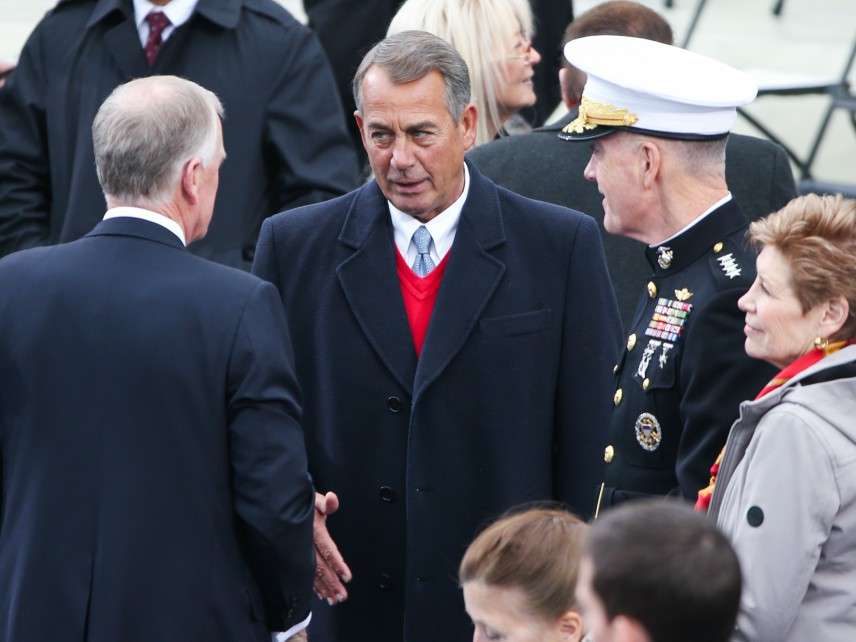Explaining His Cannabis Conversion, John Boehner Cites a Marijuana Myth
Contrary to what many supporters of legalization seem to think, prisons are not overflowing with pot smokers busted for possession.

Former House Speaker John Boehner's announcement that he has joined the board of a cannabis company provoked considerable grumbling from antiprohibitionists who noted that he could have done a lot more to advance the cause if he had backed it before leaving Congress. But the Ohio Republican and his critics agreed that his belated conversion puts him on the right side of history. They also agreed about something that is not true: Pot prohibition has filled America's prisons with marijuana users busted for possession.
"When you look at the number of people in our state and federal penitentiaries who are there for possession of small amounts of cannabis, you begin to really scratch your head," Boehner said. "We have literally filled up our jails with people who are nonviolent and frankly do not belong there."
Not so long ago, Cory Doctorow noted at Boing Boing, Boehner said he was "unalterably opposed to the legalization of marijuana." Doctorow faulted Boehner for supporting a policy that led to "the criminalization, imprisonment and ruination of millions of Americans." At Think Progress, Alan Pyke called attention to "the tens of millions of people, most of them black and Latinx, who've been sent to prison behind the pigheaded prohibitionism that Boehner helped uphold during his many years in office."
Boehner, Doctorow, and Pyke seem to be conflating arrests for marijuana offenses, which are common, with prison sentences for marijuana offenses, which are not. Between 1990 and 2016, according to the FBI's numbers, police in the United States made more than 18 million arrests for marijuana offenses, an average of about 667,000 a year. But the vast majority of these busts (90 percent in 2016) involved simple possession, as opposed to cultivation or sale. Americans arrested for simple possession typically do not spend much time in jail, let alone go to prison, which is reserved for people serving sentences longer than a year.
According to the National Organization for the Reform of Marijuana Laws, Arizona is the only state that still classifies first-time offenders charged with simple possession of small amounts as felons. Technically, possessing less than two pounds for personal use is a Class 6 felony, punishable by four months to two years in jail or prison. But a 1996 ballot initiative banned incarceration as a punishment for the first or second such offense, requiring probation instead. In Wisconsin, subsequent offenses are felonies. The rest of the states treat low-level possession offenses as misdemeanors at most.*
"The number of people in our state and federal penitentiaries who are there for possession of small amounts of cannabis," in other words, is pretty small. During the George W. Bush administration, the Office of National Drug Control Policy calculated that people convicted of simple possession (and no other offense) accounted for 0.7 percent of state prisoners in 1997. Even if you include cultivation and distribution, marijuana offenders represent a small share of state and federal prisoners—something like 3 percent, or about 45,000 people.
Since the number should be zero, that is hardly cause for complacency. Furthermore, all those millions of misdemeanor marijuana arrests over the years have taken a toll that goes far beyond time spent behind bars, including humiliation, legal expenses, inconvenience, lost income, and long-lasting ancillary penalties. The fact that the distribution of those burdens is racially skewed (as Pyke correctly notes) compounds the injustice.
Still, it is not accurate to say that "tens of millions of people" have been "sent to prison" because of pot prohibition, even if we go all the way back to the Marihuana Tax Act of 1937. Penalties may have been more severe, on average, prior to 1990, but there were far fewer arrests each year. Nor is it true that people busted for simple possession (or even marijuana offenders generally) represent a large share of state and federal prisoners.
That misconception seems to be fairly common among politicians who are newly sympathetic to sentencing reform or marijuana legalization. You may wonder whether it matters that people like John Boehner, Hillary Clinton, and Bernie Sanders have a grossly inflated notion of how many marijuana users are serving time in prison, as long as they support the right policies. But it is worth setting the record straight, since defenders of prohibition tend to seize upon such misrepresentations as a way of discrediting their opponents and suggesting the war on weed is not so bad after all. Even if legalizing marijuana will not do much to address the problem of mass incaceration, it is still morally mandatory.
[*I have corrected this passage to note the possibility of felony charges for possessing small amounts of marijuana in Arizona and Wisconsin.]


Show Comments (35)